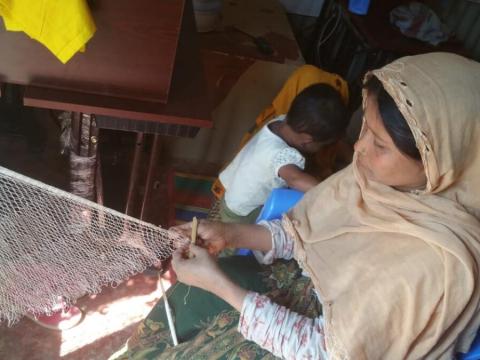Why time travel doesn’t mix with development work

By: Cat-Dan Lai-Smith, Knowledge Management & Capability Advisor, Global Livelihoods
One of my not-so-secret fascinations takes the form of time travel.
I love discovering stories of how characters grapple with bending time to satisfy their curiosity, or more significantly, so they can attempt to save the world. Some might pause or slow down time to shore up on depleted resources or obtain key knowledge on how to overcome their conflict. Others may hope to skip past events to reach their destination quicker. Whatever the plot, it seems the efforts tend to leave long-lasting after affects when someone tampers with time.
Whether you like or abhor sci-fi, I think there are some excellent takeaways on why time travel doesn’t mix very well with the business of implementing solid humanitarian and development work. Time is always of the essence, of course, when rolling out urgent responses to emergencies such as the coronavirus pandemic. Organisations like World Vision, for example, have been expertly dealing with humanitarian emergencies for decades. But significantly, after the immediate response has launched, and the media spotlight swerves to the next headlines, we have also prioritised what happens next.
This is where the lengthy work begins to ensure the children and families that lost their loved ones, homes, and jobs, etc., will have what they need to start again. Even at this juncture, or perhaps, especially in this critical space, we have to move carefully and not speed jump from offering a vulnerable family some handouts and then fast forward them to rebuilding their lives. Loss can be crippling, so people need time to heal. They also need to be reminded that there is hope, and that they do have the ability to change their circumstances with the right support.
“Empowerment is not doing something for someone that they can or should learn to do for themselves,” states Colin Dyer, senior advisor for quality and innovation for World Vision’s Global Livelihoods sector. “It’s tempting for practitioners to focus only on short term activities at low ‘cost per beneficiaries’, and not invest in quality programmes like the Ultra-Poor Graduation (UPG) project model that also helps change people’s mindsets. It takes longer, but without this time investment, it’s hard to see quality development work.”
As a faith-based organisation, a key component of our UPG and other Livelihoods work is using an approach called Empowered World View that ‘reaches deep into people’s beliefs, transforming their view of the world, so that the cycle of chronic poverty and hopelessness can be broken.’ We know that life and people are not one dimensional, so we all need to look beyond just the economics of poverty and address the challenges of the whole person. Thus, building lasting and enduring impact.
In the case of UPG, we work with extremely poor families over a period of 18 to 36 months to empower them to access the support and services they need to meet basic needs. We then offer training, including Empowered World View, such as technical, financial and others business skills training and tools so they begin to earn a sustainable income. Significantly, this approach also focuses on social empowerment and builds in activities so participants can integrate and become fully active in their local economy and community [i]
Understandably, one and half to three years can sound like ages in the midst of an emergency context. It is certainly essential to be addressing the reality of what’s needed immediately. However, bridging what humanitarian experts call the ‘nexus’, where a situation demands both humanitarian relief to move seamlessly to development programmes, needs time and focused energy. There are few ‘fast-forward’ options.
In the meantime, it’s just as well that time travel remains a fantasy, especially when it comes to humanitarian aid and development. If we truly want to restore dignity to someone who has lost practically everything, then I think enabling them to believe they can indeed influence their circumstances, and then actually pick up the tools to transform their lives beyond tomorrow is definitely well worth our time.
[i] See ‘Core Components and Outcomes’ of World Vision’s Ultra-Poor Graduation project model.